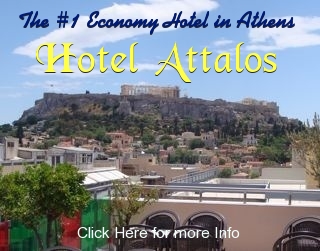History of Greece
A Brief Outline of Athenian Democracy
|
The type of democracy practiced in Athens of the fifth and fourth centuries may not have been perfect. But it was the best government up to that time and superior to what most of the ancient world was living under. Much of the credit goes to Cleisthenes whose reforms turned Athens from an oligarchy (government by the few) to a democracy (government of the people). The key to Athenian democracy was Cleithenes redrawing of the social-political landscape of Athens and Attica. The four existing tribes were replaced by ten new tribes (phylae) each split into thirds (trittyes). Each of these thirds were located in one of the three areas of Attica which had been the way the city had been split up in the past. These were the center of the city, the coast and the area beyond the hills. Then these trittyes were broken up in 140 demes (municipalities) of varying sizes. A way to imagine this is to think about when you were in class and the teacher re-arranged the seating so that you and your pals would not be sitting together and distracting each other and the rest of the class. This helped you focus on school, kept you and your friends from causing trouble (or over-throwing the teacher) and helped you make new friends. The Assembly or ecclesia was open to all male citizens and met four times a month which with ten months in the Athenian calendar came out to forty times a year. Important decisions on foreign policy and legislative issues were debated and the final decision or proclaimation was carved in stone and erected in prominent places in the city like the agora (marketplace). Since there were thousands of people involved, the assembly could get pretty noisy and unruly. Though anyone could address it, only the best speakers had the courage (or the vocal ability) to do so. Once a year they would vote on whether to hold what was called an ostracism. If it was agreed, members of the assembly wrote the name of the person they wanted banished on a piece of pottery. The person with the most votes was exiled from Athens for ten years. He did not lose his property or his rights as a citizen and after ten years he was welcome back. The first to be ostracised were the friends and relatives of the tyrant Pisistratus. Despite it being one of the most talked about practices in Athenian democracy there were only a dozen people who were ostracised though among them are Aristeides, Kimon, Themistokles, Thucydides, Alcibiades and Hyperbolus, who was the last person to be ostracised. But it achieved its purpose since fear of banishment kept those with lofty aspirations from being too aggressive. The Boule was a Council of 500 comprised of fifty men from each of the ten tribes and they were the ones who decided on what the assembly would discuss. The members of the council were chosen by their demes (municipalities) and after serving were not permitted to serve again for ten years. An executive council of nine with a chairman and a secretaty made sure things ran smoothly. The parliament in contemporary Athens is still called the Bouli. The chief magistrate of the city was called the Archon eponymous or ruler. (The word anarchy means without an archon.) His responsibilities included conducting investigations of legal cases, in particular those that involved the state. He was responsible for protecting the orphans and heiresses with no family and to appoint the choregos who was in charge of organizing the relgious festivals. The office of Archon eponymous was held for only a single year, and that year was named after him. Archons were chosen by the Areopagus, the council of elders of the city, who were those who had previously been archons. The archon basileus was an elected and ceremonial office in charge of religious matters including the Eleusinian mysteries, and sacrifices. Murders also fell under his jurisdiction since the taking of a life was considered a crime against the gods since human life was sacred. The polemarch was in charge of military matters such as protecting the borders of Athens and was considered commander-in-chief of the military though real power was with the ten strategoi (generals) who were elected, one from each tribe. The polemarch had some judicial responsibilites and was also in charge of overseeing the foreign laborers in Athens known as metics. Other official positions were chosen by lot and included among others, tax collectors,and market inspectors who patrolled the agora and made sure merchants were being honest. There were also courts with six judges known as the Thesmothetae who had little power since the Athenians believed that trials should involve mass participation. So in cases that were private suits of one individual against another there was a jury of 501 citizens. Suits which involved officials of the state were tried by a jury of 1001 and the most serious charges like treason were tried by a jury of 1501. The more important the trial the more jurors were involved. The juries voted by secret ballot and were paid for their service, receiving roughly as much as a laborer per-day. The military in Athens was set up the same way as the Boule, corresponding to the tribes. Those who sat together on the juries did the same in the theatre too so you were part of a social-political parea (group or clique). In Athens where politics was all encompassing this was important. When viewed in the context of its time the Athenian democracy was an amazing achievement which introduced the concept of equal rights and the notion of accountability by routinely investigating officials and creating a system where no person or group could become too powerful. The function of the government was to guarantee justice to the people of Athens, a revolutionary idea at the time. The annual rotation of power, the sharing of power and the fact that the people took part in the decision-making achieved the purpose of breaking the hold that the aristocrats had on Athenian society. It created a model of government which has been improved upon (for example in contemporary democracy women can vote) and twisted (the electoral college and jerrymandering come to mind). Democracy may not be the best form of government, but it is the best one that we know of. Lets call it a work in progress. One thing must be said about Athenian democracy and that is that it was a full time job. Only people with a lot of leisure time on their hands could devote the energy to this system, which brings us to the issue of slavery. Without slaves there would not have been an Athenian democracy, or at least not as we know it. The fact that even a relatively poor Athenian citizen could still afford one slave to plow his fields or work in his shop while he was debating laws in the assembly is what made a democracy of the people (if you define people as free-Athenian-male-citizens). If only the rich had been able to afford the time to go to the meetings then the laws would certainly be different, favoring the rich instead of everyone. This is not to condone slavery. It is just a fact that slavery made democracy possible. |
Back to Greece's Golden Age |
|
Questions? E-mail Matt |
|
|
Help Support Matt's Greece Travel Guides |
|



